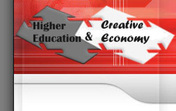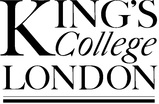Archive:
|
Final ProgrammeLocal OrganisersThe conference was promoted and organised by the University of Southampton with the support of the University of Winchester, University of Portsmouth and Southampton Solent University and the Creative Campus Initiative. The local organisers were:
Scientific Committee
Call for Papers (now closed)CALL FOR PAPER: International conference "Higher Education and the Creative economy"
22nd-23rd March 2010, University of Southampton You can download this call for paper in PDF format here Useful LinksUseful research links on the topic of Higher Education & the Creative Economy.
PartnersThe conference was organised and supported by:
|
The Keynote speakers
Kevin Stolarick, Research Director, Martin Prosperity Institute, University of Toronto.
His research interests include the relationship between firm performance and information technology and the impacts of technology, tolerance, talent, and quality of place on regional growth and prosperity. Kevin provided quantitative research and analytical support for Richard Florida during the development of his books The Rise of the Creative Class, The Flight of the Creative Class and Who’s Your City?. He continues to actively collaborate with Richard and other researchers. This research includes primary development of measures, indicators, and benchmarking approaches with significant impact on the growth and development of the Creative Class theory.
Kevin will address the question "The University and the Creative Economy: Is This Thing On?". As Kevin suggests "our findings demonstrate that universities contribute much more than simply pumping out commercial technology or generating startup companies. They suggest that the university's role in the first T, technology, while important, has been overemphasized to date, and that the university's even more powerful roles in the two other Ts-in generating, attracting and mobilizing talent and in establishing a tolerant and diverse social climate have been mostly neglected." More information on Kevin's work and research here
Lucinda Lavelli, Dean of the University of Florida College of Fine Arts.
Based on the work of the university and the college, Dean Lavelli launched a creative campus initiative joining other major universities recognizing that arts are a catalyst for creativity and innovation. In 2007, UF received a record $582 million in research funding — a tangible example of the rewards of innovation. As the university works to serve the demands of its students, academic requirements increasingly provide opportunities to foster the skills needed in the new marketplace of ideas. These skills — creativity, empathy, innovation, design skills, storytelling, caregiving and big-picture thinking — have long been developed in arts programs. Dean Lavelli has positioned the College of Fine Arts to act as a catalyst for fostering right-brained skills and incorporating creativity across the curriculum through the creative campus initiative. More information about Lucinda work here
Lucinda will be discussing "Envisioning a Creative Campus or Minding the Gap"
Scott Bridges, former Director Creative Campus Initiative, University of Alabama
Scott Bridges, former Director, Creative Campus Initiative, University of Alabama, is now "academic entrepreneur" at the University of Alabama. For the past two years his work has included developing a Creativity and Innovation Lab in the Division of Marketing and Management, A Creativity Track, Consulting/coordinating curricular reform at our local arts magnet k-8 School, and developing creative-student centered approaches to music listening classes in the School of Music. An internationally acclaimed clarinetist, Bridges has been on the University of Alabama faculty since 1978. A former member of the United States Army Band and New Jersey and North Carolina Symphony Orchestras, he has also served as a faculty member at the Shenandoah Conservatory and the University of North Carolina at Chapel Hill. He was an invited participant to the 2004, 2006 and 2008 Creative Campus Conferences, the 2007 Dana Foundation (NYC) conference, presenter at the 2007 "Creativity or Conformity" Conference in Cardiff, Wales, to the 2008 Arts Leadership Institute, (Monterey, CA), the 2008 Creative Leadership/Managers of Innovation Conference (San Diego, CA) The Arkansas Arts Council, The Alabama Arts Council/Arts Education Conference, the 2006/7/8 Imagining America conferences, and the 2007 Higher Education Partnership of Alabama Conference. Most recently he served as panelist for the 2009 Alabama Arts Council (Music). Scott Bridges will talk about "The Creative Campus and the Role of the Academic Entrepreneur"
More information about the University of Alabama Creative Campus Initiative here
Margaret Wyszomirski, Director, Arts Policy & Administration Program and Professor, Department of Art Education, The Ohio State University
Professor Wyszomirski is a faculty member of both the Department of Art Education and the School of Public Policy and Management. She has served as staff director for the bipartisan Independent Commission on the National Endowment for the Arts, as director of the Office of Policy Planning, Research and Budget at the National Endowment for the Arts, and as director of the Graduate Public Policy Program at Georgetown University. Professor Wyszomirski has been on national advisory committees for a Foundation Center analysis of arts funding, for the economic impact study of arts and tourism conducted by the Port Authority of New York and New Jersey, and for the National Center for Charitable Statistics. She was a founding member of the Research Advisory Committee of the American Council for the Arts, and was chairman of the steering committee for the 1997 American Assembly on "The Arts and the Public Purpose." More information available here
Professor Wyszomirski will talk about "Five Skill-Sets for Creative Industries Professionals: Assembly the Portfolio from Across the Campus"
His research interests include the relationship between firm performance and information technology and the impacts of technology, tolerance, talent, and quality of place on regional growth and prosperity. Kevin provided quantitative research and analytical support for Richard Florida during the development of his books The Rise of the Creative Class, The Flight of the Creative Class and Who’s Your City?. He continues to actively collaborate with Richard and other researchers. This research includes primary development of measures, indicators, and benchmarking approaches with significant impact on the growth and development of the Creative Class theory.
Kevin will address the question "The University and the Creative Economy: Is This Thing On?". As Kevin suggests "our findings demonstrate that universities contribute much more than simply pumping out commercial technology or generating startup companies. They suggest that the university's role in the first T, technology, while important, has been overemphasized to date, and that the university's even more powerful roles in the two other Ts-in generating, attracting and mobilizing talent and in establishing a tolerant and diverse social climate have been mostly neglected." More information on Kevin's work and research here
Lucinda Lavelli, Dean of the University of Florida College of Fine Arts.
Based on the work of the university and the college, Dean Lavelli launched a creative campus initiative joining other major universities recognizing that arts are a catalyst for creativity and innovation. In 2007, UF received a record $582 million in research funding — a tangible example of the rewards of innovation. As the university works to serve the demands of its students, academic requirements increasingly provide opportunities to foster the skills needed in the new marketplace of ideas. These skills — creativity, empathy, innovation, design skills, storytelling, caregiving and big-picture thinking — have long been developed in arts programs. Dean Lavelli has positioned the College of Fine Arts to act as a catalyst for fostering right-brained skills and incorporating creativity across the curriculum through the creative campus initiative. More information about Lucinda work here
Lucinda will be discussing "Envisioning a Creative Campus or Minding the Gap"
Scott Bridges, former Director Creative Campus Initiative, University of Alabama
Scott Bridges, former Director, Creative Campus Initiative, University of Alabama, is now "academic entrepreneur" at the University of Alabama. For the past two years his work has included developing a Creativity and Innovation Lab in the Division of Marketing and Management, A Creativity Track, Consulting/coordinating curricular reform at our local arts magnet k-8 School, and developing creative-student centered approaches to music listening classes in the School of Music. An internationally acclaimed clarinetist, Bridges has been on the University of Alabama faculty since 1978. A former member of the United States Army Band and New Jersey and North Carolina Symphony Orchestras, he has also served as a faculty member at the Shenandoah Conservatory and the University of North Carolina at Chapel Hill. He was an invited participant to the 2004, 2006 and 2008 Creative Campus Conferences, the 2007 Dana Foundation (NYC) conference, presenter at the 2007 "Creativity or Conformity" Conference in Cardiff, Wales, to the 2008 Arts Leadership Institute, (Monterey, CA), the 2008 Creative Leadership/Managers of Innovation Conference (San Diego, CA) The Arkansas Arts Council, The Alabama Arts Council/Arts Education Conference, the 2006/7/8 Imagining America conferences, and the 2007 Higher Education Partnership of Alabama Conference. Most recently he served as panelist for the 2009 Alabama Arts Council (Music). Scott Bridges will talk about "The Creative Campus and the Role of the Academic Entrepreneur"
More information about the University of Alabama Creative Campus Initiative here
Margaret Wyszomirski, Director, Arts Policy & Administration Program and Professor, Department of Art Education, The Ohio State University
Professor Wyszomirski is a faculty member of both the Department of Art Education and the School of Public Policy and Management. She has served as staff director for the bipartisan Independent Commission on the National Endowment for the Arts, as director of the Office of Policy Planning, Research and Budget at the National Endowment for the Arts, and as director of the Graduate Public Policy Program at Georgetown University. Professor Wyszomirski has been on national advisory committees for a Foundation Center analysis of arts funding, for the economic impact study of arts and tourism conducted by the Port Authority of New York and New Jersey, and for the National Center for Charitable Statistics. She was a founding member of the Research Advisory Committee of the American Council for the Arts, and was chairman of the steering committee for the 1997 American Assembly on "The Arts and the Public Purpose." More information available here
Professor Wyszomirski will talk about "Five Skill-Sets for Creative Industries Professionals: Assembly the Portfolio from Across the Campus"





